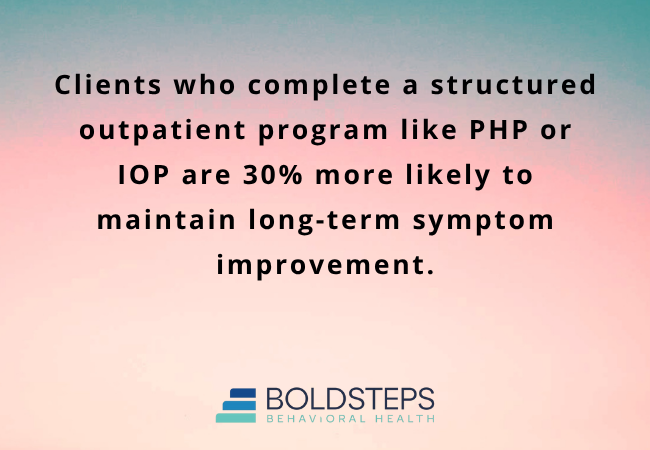Depression is more than just sadness—it’s a serious mental health condition that can interfere with every part of life, from relationships and careers to energy, motivation, and hope. If you’re struggling, know this: you’re not alone, and treatment works. At Bold Steps NH, our Depression Treatment Program in New Hampshire offers structure, support, and strategies to help you reclaim your life.
Through a combination of therapy, medication management, and compassionate care, we provide a comprehensive path to healing for individuals throughout Concord and surrounding communities.
Signs You May Need Structured Depression Treatment
Structured programs go beyond weekly therapy to offer daily, immersive support. You may benefit from one if:
- You feel persistently hopeless, numb, or empty
- Your daily tasks (work, hygiene, meals) feel unmanageable
- You’re socially withdrawing or isolating
- You’re experiencing suicidal thoughts or self-harm urges
- You’ve tried medication or therapy with little success
- You’re recovering from a mental health crisis or hospitalization
If these signs resonate with you or a loved one, a structured Mental Health Treatment Program in New Hampshire may be the next best step.
What Is a Structured Depression Treatment Program?
A structured program provides a therapeutic framework for managing moderate to severe depression, often including:
- Clinical assessments
- Daily therapy sessions (individual and group)
- Evidence-based approaches like CBT and DBT
- Medication evaluation and management
- Case management and discharge planning
- Lifestyle and coping skills training
These programs are offered at various intensities depending on individual need, and they focus on stabilizing mood, building resilience, and fostering hope through action.
Levels of Care for Depression at Bold Steps NH
Partial Hospitalization Program in New Hampshire (PHP)
- 5 days a week, up to 6 hours/day
- Intensive therapeutic structure without overnight stay
- Ideal for individuals who need full-day care but can safely live at home
Intensive Outpatient Program in New Hampshire (IOP)
- 3–5 days/week, 3 hours/day
- Combines therapy, group support, and psychiatric care
- Ideal for step-down care after PHP or for those with moderate symptoms
Outpatient Treatment Program in New Hampshire
- 1–3 sessions per week
- Long-term support for maintaining progress and managing symptoms
Each level allows clients to receive targeted, tailored care while maintaining flexibility for home, work, or school responsibilities.
What to Expect Day to Day in a Depression Program
Individual Therapy
One-on-one sessions with licensed clinicians allow you to:
- Explore emotional patterns and trauma
- Set personal recovery goals
- Learn healthy coping techniques
- Reframe negative thinking through CBT and DBT
Group Therapy
Therapist-led sessions create a safe environment to:
- Share experiences and build peer support
- Practice communication and social skills
- Reduce isolation and shame
Medication Management
Our psychiatric providers:
- Review current prescriptions
- Evaluate medication effectiveness
- Adjust dosages or make new recommendations
- Educate you about side effects and interactions
Skill-Building Workshops
Programs include training in:
- Stress management
- Sleep hygiene
- Time and energy management
- Mindfulness and grounding exercises
The Role of Routine in Managing Depression
Depression thrives in chaos and stagnation. Structured treatment programs reintroduce routine, helping regulate:
- Sleep-wake cycles
- Eating habits
- Physical activity
- Social engagement
Creating predictability reduces decision fatigue, boosts self-esteem, and helps you reconnect with a sense of purpose. Our team works with you to develop routines that extend beyond treatment and into everyday life.
How Group Therapy Creates Connection and Motivation
One of the most powerful tools in depression recovery is peer support. Group therapy provides:
- Validation: You’re not alone in how you feel
- Motivation: Seeing others grow inspires hope
- Accountability: Shared goals encourage follow-through
- Community: Isolation breaks when you connect authentically
At Bold Steps NH, our groups are facilitated by trained professionals who ensure a respectful, inclusive space.
Treating Co-Occurring Conditions Like Anxiety or Addiction
Depression rarely occurs in a vacuum. Many clients also struggle with:
- Generalized anxiety
- Panic attacks
- Substance use or alcohol misuse
- Trauma-related disorders
- Bipolar depression
Our integrated care model addresses these through:
- Anxiety Disorder Treatment in New Hampshire
- Addiction Treatment Program in New Hampshire
- Dual diagnosis services within structured outpatient programs
Treating both the root and the symptom leads to better long-term outcomes and reduces the risk of relapse.
Who Is a Good Fit for Structured Depression Treatment?
This type of program is ideal for individuals who:
- Can benefit from daily therapeutic structure
- Are medically stable and don’t require hospitalization
- Have motivation to engage but need help functioning
- Need a step-down level of care after inpatient or crisis stabilization
- Struggle with co-occurring mental health or addiction issues
Our clinicians conduct a comprehensive intake assessment to determine which level of care is the best fit for your current needs and long-term goals.
How Family Involvement Supports Healing
Depression affects the entire family system, not just the individual. At Bold Steps NH, we encourage family participation through:
- Family therapy sessions
- Psychoeducation on depression and recovery
- Boundary-setting and communication coaching
- Support planning for post-treatment life
Informed, compassionate families can help prevent relapse, reduce shame, and improve overall outcomes.
How Long Does Treatment Last?
There’s no set timeline for healing from depression, but here’s a general guide:
- PHP: 2–4 weeks, depending on severity
- IOP: 4–8 weeks, based on progress
- Outpatient: Ongoing, with sessions gradually tapering
Your treatment plan evolves with you. Regular progress reviews ensure that care remains responsive and goal-driven.
What Happens After the Program Ends?
Discharge planning is part of every client’s journey. After completing structured care, we offer:
- A step-down plan into lower-intensity outpatient therapy
- Referrals to community or virtual support groups
- Continued access to psychiatric care
- Alumni support and relapse prevention services
- Recommendations for wellness coaching and lifestyle supports
Recovery is a process—not a deadline. We stay connected for as long as you need.
Why Choose Bold Steps NH for Depression Treatment?
As a trusted Behavioral Health Treatment Center in New Hampshire, we provide:
- Licensed therapists and psychiatric providers
- Evidence-based therapies tailored to you
- Dual diagnosis and addiction support
- Multiple levels of care (PHP, IOP, outpatient)
- Flexible scheduling with virtual care options
- Safe, compassionate environment with experienced staff
Our goal is to help you rediscover strength, rebuild purpose, and restore your connection to life.
Conclusion
You don’t have to continue struggling in silence. A structured Depression Treatment Program in New Hampshire offers not just a plan—but a path. At Bold Steps NH, we walk it with you, one step at a time, until hope feels real again.
Call us at 603.915.4223 to schedule a confidential assessment and begin your recovery journey today. Healing isn’t out of reach. It’s just one bold step away.
FAQ on Depression Treatment Program
What is a structured depression treatment program?
It’s a higher level of care that includes scheduled therapy, group support, psychiatric services, and skills training to help manage depression effectively.
Who should consider a structured depression program?
Anyone with moderate to severe depression, especially if daily functioning is affected or if previous outpatient therapy hasn’t helped.
How is it different from traditional therapy?
Structured programs like PHP and IOP offer daily or near-daily support and comprehensive services, not just weekly talk therapy.
Do I need to stay overnight?
No. All levels of depression treatment at Bold Steps NH are outpatient-based. You return home after your therapy sessions each day.
Is medication part of the program?
Yes. Medication management is included and overseen by licensed psychiatric providers as part of your individualized treatment plan.
Can I attend work or school while in the program?
Yes. Especially in IOP or standard outpatient programs, scheduling is flexible enough to support life responsibilities.



